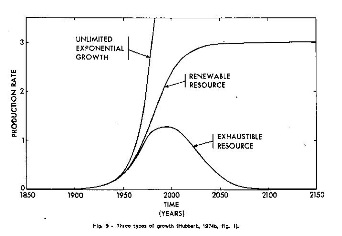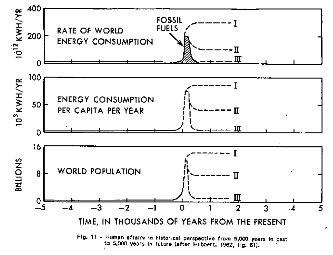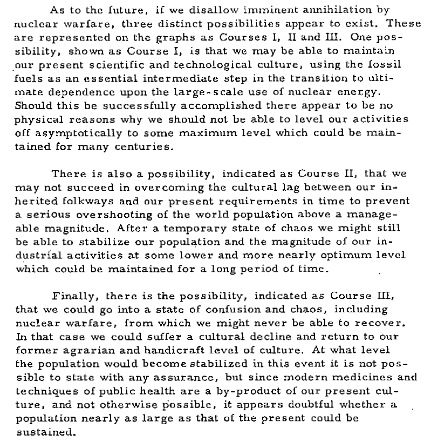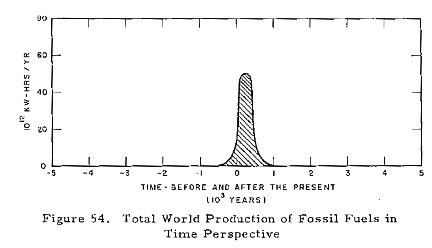I was scanning the internet, trying to find other advocates for what I have recently started to call the 4th Industrial Revolution (October 22) — a revolution that will be fueled by sustainable energy sources, replacing the ones that pollute the atmosphere and cause unsustainable climate change with catastrophic effects. I came across a blog titled “Our Finite World,” run by Gail Tverberg. The blog strongly reminded me of my own blog in its mission to save the world from its own mindlessness, through the use of the educational system. A long comment on that blog redirected my attention once again to M. King Hubbert. I have mentioned Hubbert in my book and in my previous blog, but only in the context of his detailed calculations of the available oil resources in the USA and the emergence of the now famous Hubbert peak. This peak depicts these resources in the form of a bell-shaped curve, or as I called it in my previous blog, a wavelet. In terms of the US reserves, the Hubbert peak is in agreement with future estimates.
The blog has refocused my attention to other parts of Hubbert’s work, which focus on longer-term issues of what to do about the projected decline of these reserves.
In one aspect, Hubbert agrees with Robert J. Gordon’s analysis, in terms of the uniqueness of the present. In his 1962 very detailed report titled “Energy Resources,” submitted to the Committee on Natural Resources, he was trying to extend his Hubbert Peak analysis both backward and forward, 5000 years. The result of this analysis is shown in Figure 1.
This was not the end of the story, either in that report or in his later writings.
Figures 2 and 3 were taken from a short paper titled “Exponential Growth as a Transient Phenomena in Human History,” that was published in 1976 as part of a collection to celebrate the United States’ 200th birthday.
 Figure 2- Three types of growth (Hubbert, 1974)
Figure 2- Three types of growth (Hubbert, 1974)
 Figure 3- Human affairs in historical perspective from 5,000 years in past to 5,000 years in future (after Hubbert, 1962)
Figure 3- Human affairs in historical perspective from 5,000 years in past to 5,000 years in future (after Hubbert, 1962)
Both figures include various future scenarios, which are clearly marked in Figure 3.
Here is Hubbert’s definition of the three scenarios, taken from the 1962 report that describes an earlier version of these scenarios:
 Today, one can obviously argue about the role nuclear energy plays in Hubbert’s scenarios. His words can be repeated today and redefined as the 4th Industrial Revolution. While climate change didn’t actually play any role in Hubbert’s analysis, he would have been justifiably alarmed to have a front row seat watching us expedite the time scale needed for implementation of this revolution.
Today, one can obviously argue about the role nuclear energy plays in Hubbert’s scenarios. His words can be repeated today and redefined as the 4th Industrial Revolution. While climate change didn’t actually play any role in Hubbert’s analysis, he would have been justifiably alarmed to have a front row seat watching us expedite the time scale needed for implementation of this revolution.


Pingback: Yes We Can 3: The Alcohol Debate | ClimateChangeFork
I’m not that much of a online reader to be honest
but your sites really nice, keep it up! I’ll go ahead and bookmark your website to come back in the future.
Many thanks
When someone writes an post he/she maintains the image of a user
in his/her brain that how a user can know it. So that’s why this article is amazing.
Thanks!
Pingback: Economic Growth and Problems with my Sourdough Bread. | ClimateChangeFork
Great blog!
M. King Hubbert scenarios are very interesting. His course 1,2 and 3 scenarios were advanced at that time in 1965 but he states we might not be able to maintain our scientific and technological culture using the fossil fuel but as technology becomes more advance his scenarios wouldn’t be possible in the future. With our advance education we will always find a way to avoid such things from happening in this day in age
The fourth industrial revolution should NOT include nuclear energy. How have we not learned? Wasn’t Chernobyl enough? After all these years of using nuclear sources, we have not managed a way to safely and effectively eliminate wastes. (Not that we effectively eliminate by-products of fossil fuels, either. It is either absorbed into the Earth and contributes to its ever-growing toxicity, or accumulates somewhere on land or in the ocean, contributing to pollution and exploitation of our sensitive ecology) The affects of nuclear waste are NOTICEABLY more detrimental. It is borderline atrocious that in certain areas, the industry has even gained footholds and increased over the past decade or so. How is averting fossil fuels by using nuclear energy a solution? Fighting fire with fire is not only hypocritical and unintelligent, it is disastrous.
My thoughts about the blog are what the solution to our problem is, how do we save the world. What technology we can use that will be sustainable. The only things I can think about right now are nuclear energy. It is tough because nuclear energy seems like the sustainable resource, but it extremely unsafe and we know what can happen because of past experiences. Another suggestion is we have to try to regulate our energy supple better, but that hard to do considering this economy because people can’t afford it. Another suggestion is to just wait it out. It seems to me sometimes people don’t change until it’s at the tipping point of total disaster to change. Finding a common problem of interest will bring the world to see what’s really at stake and trying to figure out how to survive.
In my response and knowledge about this blog, the burning of the fossil fuels is a major contributor for greenhouse gases. Unfortunately, this problem is leading the solar energy being trapped and also increases the temperature rate above average. There is also major concern about the earth’s surface regarding these rising temperatures. In the past few decades, there were used be places when that place had permanent amount of snow, but now with the rising temperatures there’s no snow at all. While the technology increases, amount of energy use will also increase. The atmospheric absorption CO2 is increasing day by day. If scientists want to avoid total disaster in the future then the time would be now to use their latest technology available. Another situation would be the rising price of the oil. During these difficult economic times, oil prices have drastically increased recent years. Hopefully, with the efforts of the modern technology we can use it to at least reduce or minimize the effects of possible global warming.
Pingback: Two Shades of Audience | ClimateChangeFork
From my understanding industrializing met our desires but not our needs. It has inflicted more damage and caused a bigger problems then solving them. We should be finding ways to use nuclear energy to protect our environmental instead of using it to fight warfare. Stabilizing the population growth would probably have a bigger impact for saving the planet. Using renewable resources has saved a lot of damage but does not stop it. Unless we are industrializing nuclear power to save our planet and not to attack ourselves or our environment then will our global connections and relationships will be mended. Finding a common problem of interest will bring the world to see the bigger picture that the war is not on each other but on figuring out how to make sure humanity stabilizes and survives.
The twentieth century technologies that have contributed so abundantly to today’s problems should be phased out and replaced with twenty first century technologies designed with environmental sustainability and restoration in mind. The economy should be dematerialized to the fullest possible extent through a new generation of technologies that sharply reduce the consumption of natural resources and the generation of residuals wastes per unit of economic output. If a transition from dependence on fossil fuels and nuclear power to an energy supply system based on increased effiency and renewable sources such as the wind, solar energy, biomass, etc. It will take a soft path that would be better for the environment , would result more secure and more economical energy system that would reduce the treat of international conflict over energy resource.Rather than treat energy as a commodity to be consume without regard for its consequences , we might instead recover a much older notion of energy as something to be valued, saved, and used to meet our needs in ways that respect the realities of the natural world. The choice is ours form a global partnership to care for Earth and one another or risk the destruction of ourselves and the diversity. We have the knowledge and the technology to provide for all and to reduce our impacts on the environment.
The burning of fossil fuels is the number one producer of greenhouse gases that is causing more solar energy to be trapped causing temperatures, on average, to increase. To deny global warming is to deny that carbon dioxide is, in fact, a greenhouse gas which is beyond dispute at this point in time. CO2 traps heat and we produce a lot of it so this excess CO2 traps more heat. This is not complicated. The atmospheric concentration of CO2, a greenhouse gas, is increasing every day. This raises concerns that solar heat will be trapped and the average surface temperature of the Earth will rise in response. If we make needed changes today most scientists believe that we will be able to avoid total disaster which is unavoidable if we continue our present course.The increased levels of fossil fuel use in this country has given birth to the green movement urging people to start exploring alternative forms of energy to avoid depleting our fossil fuel supplies completely. The ideas behind this movement have become popular lately as there is much cause for concern. The main reason that people are suddenly concerned about the use of oil is the recent drastic increase in price. As we enter a period of economic sluggishness, oil prices continue to rise. This puts many in an impossible situation.we can reduce our use of fossil fuels and start looking at alternative sources of energy, we not only improve the quality of the environment, but we also reduce our dependence on other countries for our energy resources.
If nuclear warfare were to occur our population would not be able to sustain. I feel if that were to occur most natural resources would be ruined and the population would then in turn have to adapt with what it is given. As technology increases energy use is also going to increase. It just a matter of time that we must regulate fossil fuels. It is tough because nuclear energy seems like the sustainable resource, but it extremely unsafe in the hands of the wrong people. Think the answer is alternative fuel sources with resources we do have and that can be renewed. Science has come so far why is it hitting a halt here?